| Listing 1 - 10 of 50 | << page >> |
Sort by
|
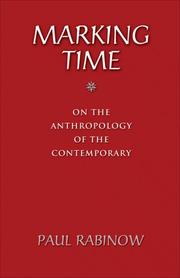
ISBN: 9780691133621 9780691133638 0691133638 069113362X 9786612086663 1282086669 140082799X 9781400827992 9781282086661 6612086661 Year: 2008 Publisher: Princeton Princeton university
Abstract | Keywords | Export | Availability | Bookmark
 Loading...
Loading...Choose an application
- Reference Manager
- EndNote
- RefWorks (Direct export to RefWorks)
In Marking Time, Paul Rabinow presents his most recent reflections on the anthropology of the contemporary. Drawing richly on the work of Michel Foucault, John Dewey, Niklas Luhmann, and, most interestingly, German painter Gerhard Richter, Rabinow offers a set of conceptual tools for scholars examining cutting-edge practices in the life sciences, security, new media and art practices, and other emergent phenomena. Taking up topics that include bioethics, anger and competition among molecular biologists, the lessons of the Drosophila genome, the nature of ethnographic observation in radically new settings, and the moral landscape shared by scientists and anthropologists, Rabinow shows how anthropology remains relevant to contemporary debates. By turning abstract philosophical problems into real-world explorations and offering original insights, Marking Time is a landmark contribution to the continuing re-invention of anthropology and the human sciences.
Philosophical anthropology --- Anthropology --- Contemporary, The. --- Anthropologie --- Contemporanéité --- Philosophy. --- Philosophie --- Contemporary, The --- Philosophy --- #SBIB:39A3 --- Antropologie: geschiedenis, theorie, wetenschap (incl. grondleggers van de antropologie als wetenschap) --- Contemporanéité --- Contemporaneity --- Time --- Anthropology - Philosophy
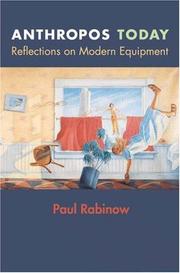
ISBN: 0691115656 0691115664 9786612087035 1282087037 1400825903 9781400825905 9780691115665 9780691115658 Year: 2003 Publisher: Princeton, N.J. Princeton University Press
Abstract | Keywords | Export | Availability | Bookmark
 Loading...
Loading...Choose an application
- Reference Manager
- EndNote
- RefWorks (Direct export to RefWorks)
The discipline of anthropology is, at its best, characterized by turbulence, self-examination, and inventiveness. In recent decades, new thinking and practice within the field has certainly reflected this pattern, as shown for example by numerous fruitful ventures into the "politics and poetics" of anthropology. Surprisingly little attention, however, has been given to the simple insight that anthropology is composed of claims, whether tacit or explicit, about anthropos and about logos--and the myriad ways in which these two Greek nouns have been, might be, and should be, connected. Anthropos Today represents a pathbreaking effort to fill this gap. Paul Rabinow brings together years of distinguished work in this magisterial volume that seeks to reinvigorate the human sciences. Specifically, he assembles a set of conceptual tools--"modern equipment"--to assess how intellectual work is currently conducted and how it might change. Anthropos Today crystallizes Rabinow's previous ethnographic inquiries into the production of truth about life in the world of biotechnology and genome mapping (and his invention of new ways of practicing this pursuit), and his findings on how new practices of life, labor, and language have emerged and been institutionalized. Here, Rabinow steps back from empirical research in order to reflect on the conceptual and ethical resources available today to conduct such inquiries. Drawing richly on Foucault and many other thinkers including Weber and Dewey, Rabinow concludes that a "contingent practice" must be developed that focuses on "events of problematization." Brilliantly synthesizing insights from American, French, and German traditions, he offers a lucid, deeply learned, original discussion of how one might best think about anthropos today.
Philosophical anthropology --- Philosophical anthropology. --- Anthropology --- Culture --- Anthropologie philosophique --- Anthropologie --- Methodology. --- Semiotic models. --- Méthodologie --- Modèles sémiotiques --- Philosophy --- Methodology --- Semiotic models --- Méthodologie --- Modèles sémiotiques --- Anthropology, Philosophical --- Man (Philosophy) --- Ethnology --- Semiotics --- Philosophy. --- Civilization --- Life --- Ontology --- Humanism --- Persons --- Philosophy of mind --- Anthropology - Philosophy --- Anthropology - Methodology --- Culture - Semiotic models --- Social Sciences -- Anthropology -- Cultural anthropology. --- Anthropology -- Ethnographic methodology. --- Anthropology. --- Culture.
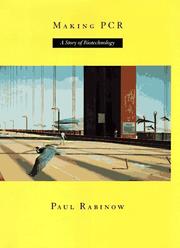
ISBN: 0226701476 0226701468 9780226701479 Year: 1996 Publisher: Chicago, IL : University of Chicago Press,
Abstract | Keywords | Export | Availability | Bookmark
 Loading...
Loading...Choose an application
- Reference Manager
- EndNote
- RefWorks (Direct export to RefWorks)
Polymerase chain reaction --- Biotechnology --- Réaction en chaîne de la polymérase --- Biotechnologie --- Social aspects --- History --- Aspect social --- Histoire --- History. --- -Chain reaction, Polymerase --- PCR (Biochemistry) --- Polymerization --- DNA polymerases --- -History --- Réaction en chaîne de la polymérase --- Polymerase chain reaction - History. --- Polymères
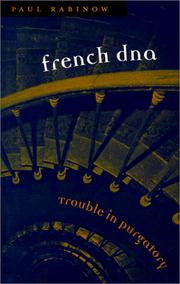
ISBN: 0226701506 9780226701509 Year: 1999 Publisher: Chicago, IL London University of Chicago Press
Abstract | Keywords | Export | Availability | Bookmark
 Loading...
Loading...Choose an application
- Reference Manager
- EndNote
- RefWorks (Direct export to RefWorks)
Genoom [Menselijk ] --- Génome humain --- Human genome --- Menselijk genoom --- Human genetics --- Non-insulin-dependent diabetes --- Human genome. --- Human gene mapping --- Biotechnology industries --- Génétique humaine --- Diabète non insulinodépendant --- Cartes chromosomiques humaines --- Bio-industries --- Government policy --- Research --- Politique gouvernementale --- Recherche --- Centre d'étude du polymorphisme humain. --- Millennium Pharmaceuticals, Inc. --- Centre d'étude du polymorphisme hum --- Millennium Pharmaceuticals, Inc --- Génétique humaine --- Diabète non insulinodépendant --- Génome humain --- Centre d'étude du polymorphisme humain. --- United States --- France --- Centre d'étude du polymorphisme humain --- Type 2 diabetes --- Human genetics - Government policy - France --- Non-insulin-dependent diabetes - Research - United States --- Non-insulin-dependent diabetes - Research - France --- Human gene mapping - France --- Biotechnology industries - United States
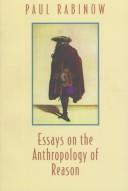
ISBN: 0691011583 0691011591 1400851793 9780691011592 9780691011585 Year: 1996 Publisher: Princeton (N.J.): Princeton university press
Abstract | Keywords | Export | Availability | Bookmark
 Loading...
Loading...Choose an application
- Reference Manager
- EndNote
- RefWorks (Direct export to RefWorks)
This collection of essays explains and encourages new reflection on Paul Rabinow's pioneering project to anthropologize the West. His goal is to exoticize the Western constitution of reality, emphasize those domains most taken for granted as universal, and show how their claims to truth are linked to particular social practices, hence becoming effective social forces. He has recently begun to focus on the core of Western rationality, in particular the practices of molecular biology as they apply to our understanding of human nature. This book moves in new directions by posing questions about how scientific practice can be understood in terms of ethics as well as in terms of power.The topics include how French socialist urban planning in the 1930s engineered the transition from city planning to life planning; how the discursive and nondiscursive practices of the Human Genome Project and biotechnology have refigured life, labor, and language; and how a debate over patenting cell lines and over the dignity of life required secular courts to invoke medieval notions of the sacred. Building on an ethnographic study of the invention of the polymerase chain reaction--which enables the rapid production of specific sequences of DNA in millions of copies Rabinow, in the final essay, reflects in dialogue with biochemist Tom White on the place of science in modernity, on science as a vocation, and on the differences between the human and natural sciences.
Intellectual life --- Science and civilization. --- Social sciences --- Ethnology --- Vie intellectuelle --- Sciences et civilisation --- Sciences sociales --- Anthropologie sociale et culturelle --- History --- Histoire --- Science and civilization --- Behavioral sciences --- Human sciences --- Sciences, Social --- Social science --- Social studies --- Civilization --- Civilization and science --- History and science --- Science and history --- Science and society --- Progress --- Cultural anthropology --- Ethnography --- Races of man --- Social anthropology --- Anthropology --- Human beings --- SOCIAL SCIENCE / Anthropology / General. --- Althusser, Louis. --- Ambroselli, Claire. --- Aristotle. --- Augustine, Saint. --- Bachelard, Gaston. --- Banham, Reyner. --- Bernard, Claude. --- Bertillon, Alphonse. --- Bourdieu, Pierre. --- Brenner, Sydney. --- Canguilhem, Georges. --- Cantor, Charles. --- Chakrabarty, Ananda. --- Dagognet, François. --- Deleuze, Gilles. --- Descartes, René. --- Eisenberg, Rebecca. --- Elias, Norbert. --- Feyerabend, Paul. --- Flaubert, Gustave. --- Gadamer, Hans-Georg. --- Habermas, Jurgen. --- Halbwachs, Maurice. --- Heidegger, Martin. --- Holtzman, Neil. --- Jacob, François. --- Jameson, Fredric. --- Kant, Immanuel. --- Krimsky, Sheldon. --- Latour, Bruno. --- Le Corbusier. --- Lyotard, Jean-François. --- Malinowski, Bronislaw. --- Mauss, Marcel. --- Ortner, Sherry. --- Prost, Henri. --- Rimbaud, Arturo. --- Said, Edward. --- Sarich, Vince. --- Sartre, Jean-Paul. --- Schaffer, Simon. --- Sellier, Henri. --- Sorj, Bernardo. --- Strathern, Marilyn. --- Tapper, Marion. --- Washburn, Sherwood. --- Watson, James. --- Weber, Max. --- Williams, Raymond. --- Wilson, Allan. --- Wittgenstein, Ludwig. --- Intellectual life - History - 20th century --- Social sciences - History - 20th century --- Ethnology - History - 20th century --- Ethnologie --- 20e siècle --- 20e siècle

ISBN: 0262181347 Year: 1989 Publisher: Cambridge MIT press
Abstract | Keywords | Export | Availability | Bookmark
 Loading...
Loading...Choose an application
- Reference Manager
- EndNote
- RefWorks (Direct export to RefWorks)
316.422 --- Ethnology --- -Ethnology --- -Philosophy, French --- -316.42 --- French philosophy --- Cultural anthropology --- Ethnography --- Races of man --- Social anthropology --- Anthropology --- Human beings --- Innovatie. Modernisering --- History --- -History --- -Social change. Sociale ontwikkeling. Sociale veranderingen. Modernisering. Evolutie .Sociale revolutie. Modernisme --- 316.422 Innovatie. Modernisering --- 316.42 Social change. Sociale ontwikkeling. Sociale veranderingen. Modernisering. Evolutie .Sociale revolutie. Modernisme --- Social change. Sociale ontwikkeling. Sociale veranderingen. Modernisering. Evolutie .Sociale revolutie. Modernisme --- Philosophy, French --- 316.42
Book
ISBN: 0226701484 Year: 1975 Publisher: Chicago University of Chicago press
Abstract | Keywords | Export | Availability | Bookmark
 Loading...
Loading...Choose an application
- Reference Manager
- EndNote
- RefWorks (Direct export to RefWorks)
#SBIB:39A77 --- 316.32 <64> --- Islam --- -Mohammedanism --- Muhammadanism --- Muslimism --- Mussulmanism --- Religions --- Muslims --- Etnografie: Noord-Afrika en het Midden-Oosten --- Globale samenlevingsvormen--Marokko --- Morocco --- Zaouia Sidi Lahsene, Morocco --- Civilization. --- Politics and government. --- Zaouia Sidi Lahsene, Morocco. --- -Etnografie: Noord-Afrika en het Midden-Oosten --- 316.32 <64> Globale samenlevingsvormen--Marokko --- Mohammedanism
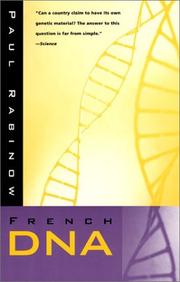
ISBN: 9780226701516 Year: 1999 Publisher: Chicago : The University of Chicago Press,
Abstract | Keywords | Export | Availability | Bookmark
 Loading...
Loading...Choose an application
- Reference Manager
- EndNote
- RefWorks (Direct export to RefWorks)
Book
ISBN: 9786613265128 0226701719 1283265125 9780226701714 9780226701691 0226701697 9780226701707 0226701700 9781283265126 Year: 2011 Publisher: Chicago University of Chicago Press
Abstract | Keywords | Export | Availability | Bookmark
 Loading...
Loading...Choose an application
- Reference Manager
- EndNote
- RefWorks (Direct export to RefWorks)
In this culmination of his search for anthropological concepts and practices appropriate to the twenty-first century, Paul Rabinow contends that to make sense of the contemporary anthropologists must invent new forms of inquiry. He begins with an extended rumination on what he gained from two of his formative mentors: Michel Foucault and Clifford Geertz. Reflecting on their lives as teachers and thinkers, as well as human beings, he poses questions about their critical limitations, unfulfilled hopes, and the lessons he learned from and with them. This spirit of collaboration animates The Accompaniment, as Rabinow assesses the last ten years of his career, largely spent engaging in a series of intensive experiments in collaborative research and often focused on cutting-edge work in synthetic biology. He candidly details the successes and failures of shifting his teaching practice away from individual projects, placing greater emphasis on participation over observation in research, and designing and using websites as a venue for collaboration. Analyzing these endeavors alongside his efforts to apply an anthropological lens to the natural sciences, Rabinow lays the foundation for an ethically grounded anthropology ready and able to face the challenges of our contemporary world.
Anthropology. --- Interdisciplinary research. --- Anthropology --- Interdisciplinary research --- Geertz, Clifford. --- Hyman, Paul. --- contemporary, academic, scholarly, research, professor, anthropology, college, university, higher education, textbook, anthropological, anthropologist, 21st century, modern, inquiry, questions, hypothesis, science, scientific, geertz, teacher, thinker, intellectual, philosophy, philosophical, collaboration, experiment, fieldwork, synthetic, biology, teaching, observation, methodology, interdisciplinary.
Book
ISBN: 0226701697 0226701700 9780226701691 9780226701707 Year: 2011 Publisher: Chicago University of Chicago press
Abstract | Keywords | Export | Availability | Bookmark
 Loading...
Loading...Choose an application
- Reference Manager
- EndNote
- RefWorks (Direct export to RefWorks)
Anthropology --- Anthropology --- Interdisciplinary research --- Interdisciplinary research --- Geertz, Clifford. --- Hyman, Paul.
| Listing 1 - 10 of 50 | << page >> |
Sort by
|

 Search
Search Feedback
Feedback About UniCat
About UniCat  Help
Help News
News